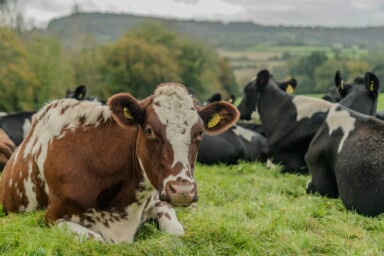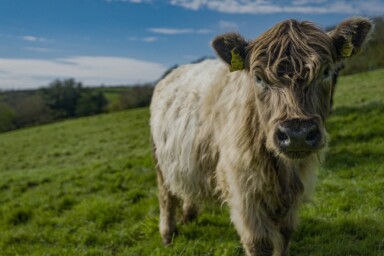Small Abattoirs are the backbone of rural farming, providing a crucial service to thousands of family farms. As we emerge from COVID-19, the continued demise of the small abattoir sector not only threatens these small businesses but is in danger of undermining the Government’s own commitments to local, healthy, environmentally friendly food and farming – and our net zero commitments on climate change.
The Sustainable Food Trust (SFT) [1] and Campaign for Local Abattoirs (CFLA) [2] strongly welcome a report published today by the All-Party Parliamentary Group for Animal Welfare (APGAW) [3] that recognises small abattoirs as an essential link in the farm-to-fork chain for local meat, and a crucial part of the UK’s agricultural infrastructure. In particular, the report’s recommendation for Government to support the sector with an emergency fund was seen as crucial to avoid further closures. [4]
Patrick Holden, CEO of the Sustainable Food Trust said: “Our food and farming systems are facing multiple challenges with an Agriculture Bill that fails to safeguard UK standards and a future subsidy system that could see the demise of the family farm if action is not taken. More than ever we need a well distributed network of small abattoirs that offer ‘private kill’ services for farmers who wish to add value by marketing and selling their meat direct to consumers. The public has clearly shown demand for local, traceable food produced to a very high standard, while COVID-19 has taught us that a resilient local food supply is paramount for UK food security. Small abattoirs are an essential part of the local food and farming infrastructure that makes this possible.”
The report calls attention to the alarming decline in the number of small abattoirs as previously highlighted by the Sustainable Food Trust’s campaign over the past two years. A third of small abattoirs closed in the last ten years alone – with only 62 now left in the UK. The most recent closure was only two weeks ago and many more are on the brink as a result of one-size-fits-all regulation, rising costs and the collapse in value of hides and skins. [5] Farmers are increasingly concerned by these losses and many now face long waiting lists and uneconomical distances to slaughter, putting their businesses at risk and raising concerns for animal welfare. The Government’s own commitment to shortened journey times is not possible without a network of small abattoirs. [6]
The report reiterates CFLA recommendations to urgently address this problem. Financial support is critically needed to modernise the sector. As a step to achieving this, the report recommends ensuring abattoirs are recognised in the Agriculture Bill, which has its second reading in the House of Lords this week. [7]
Other recommendations include a regulatory framework that is appropriate to the size of the business, [8] a Competition Inquiry into the waste collection market, [9] support for apprenticeships and training, a local food label to showcase provenance [10] and support for mobile abattoirs. [11]
The report has been widely welcomed by the food and farming sector.
Richard Stevenson, National Craft Butchers Technical Manager said: “The report will, I think, be well received by all sectors of the meat and livestock industry. It is comprehensive, well-balanced and well-researched. Today feels like a real turning point in the battle of survival for small abattoirs; something that we at NCB and our partners Sustainable Food Trust have worked tirelessly on for the last two years plus. The report proves that, at last, parliament is starting to take notice. We will now lift our sights higher and ram home the message to Ministers and the higher echelons of government.”
John Mettrick, National Craft Butchers and small abattoir owner said: “Small abattoir operators all over the UK will be very pleased with the content and recommendations of this report. After years of bringing these problems to the fore, it’s refreshing the APGAW have listened to concerns and made recommendations to Government.”
Lady Parker, owner of Fir Farm and trustee of the SFT said: “This report feels like real progress. The APGAW have recognised the critical importance of the small abattoir infrastructure, especially for small farmers who are adding value to their product and supporting healthy, local food. This is much needed encouragement at a critical time – let’s hope it can turn into action.”
Christopher Price, CEO of the Rare Breeds Survival Trust said: “We welcome this report. The livestock sector is going to change radically over the next few years. As subsidies are phased out, and people become increasingly interested in the quality, provenance and environmental impact of what they eat, farmers will inevitably be keeping fewer animals but a much more diverse range of breeds. We desperately need an abattoir network set up for this, able to process smaller numbers of ‘non-standard’ animals.”
Phil Stocker, CEO National Sheep Association said: “This is a crucial report that comes at a time when big decisions are being made with regard to food and farming policy. COVID-19 has shown that localised meat supply chains retailing through farm shops, butchers and home deliveries, provide resilience, choice and service to consumers, while giving the chance to add value, retain margins and create a close relationship with the public, for producers. Many farm shops have reported meat sales up by a factor of 3 or 4 during this period and there are clear opportunities to be gained by holding onto this growth as we move forward, potentially growing further. However this can’t be done without sufficient abattoir facilities that provide a high quality and affordable local service. There is no doubt that most people who choose to buy their meat locally also want to see the entire supply chain as local as possible and this APGAW report highlights key actions that need to be taken to retain, and expand where appropriate, abattoir facilities. With many small and low throughput abattoirs having been lost, and those remaining still under immense pressure, the only thing more crucial than this report is to get its recommendations implemented.”
Peter Greig, Pipers Farm said: “The time is now for a once in a lifetime chance to reshape the vision for our farmed landscape. The next generation of farmers must be much more than part of a globalised commodity supply chain. Local abattoirs offer the truly artisan craft of skilled slaughter for the rich diversity of entrepreneurs who sell meat as a valued, respected product. Natural capital and human capital are equally important in a truly resilient, sustainable supply chain, and local abattoirs are a vital link.”
CONTACT
Megan Perry – Head of Communications, Sustainable Food Trust
megan@sustainablefoodtrust.org
07761804341
NOTES:
[1] The Sustainable Food Trust is a UK-based charity established in 2011 by Patrick Holden CBE, former director of the Soil Association. The charity works to accelerate the transition to more sustainable food and farming systems globally and focuses on a number of key areas including true cost accounting, sustainability metrics, healthy soils and sustainable livestock systems. For more information visit: https://sustainablefoodtrust.org
[2] The Campaign for Local Abattoirs was established following the publication of the Sustainable Food Trust’s report, ‘A Good Life and A Good Death: Relocalising Farm Animal Slaughter’ in February 2018. The Campaign group includes the Sustainable Food Trust, National Craft Butchers and Fir Farm and is supported widely by a range of food and farming organisations and industry. The group has been working with Defra and the Food Standards Agency to find solutions to some of the problems facing abattoirs and had a meeting with Farming Minister George Eustice earlier this year to bring the issues to his attention. The group provided evidence to the APGAW for their report.
For more information visit: https://sustainablefoodtrust.org/key-issues/campaign-for-local-abattoirs/
National Craft Butchers: https://www.nationalcraftbutchers.co.uk
Fir Farm: https://firfarm.co.uk
[3] The All-Party Parliamentary Group for Animal Welfare report, ‘The Future for Small Abattoirs in the UK: Report on an inquiry into small red meat abattoir provision’ was published on Monday 8th June. Link to the report: https://apgaw.org/2020/06/07/apgaw-publishes-report-on-small-abattoirs/
[4] The APGAW report recommends that an emergency fund for small abattoirs should be put in place. The report also states that, “Small abattoirs contributing to the public goods of animal welfare and environmental benefits should be recognised and eligible for capital payments in any future agricultural support framework.”
[5] Hides and skins were once a critical part of an abattoirs’ income, with hides worth around £40 each and skins worth £6.50 twenty years ago. Now, abattoirs are paying to have hides and skins taken away to landfill. This is detrimental to abattoirs, farmers and the environment as we are wasting a natural product whilst simultaneously replacing it with synthetic materials some of which cause significant pollution. Farmers also bear the brunt of the cost as abattoir often have to on in charges.
[6] The UK Government has stated that animals should be slaughtered as close to the point of production as possible, yet with abattoirs continuing to close, many farmers are already travelling long distances of 100 miles or more to take only one or two animals to slaughter.
[7] It is essential that the Agriculture Bill has provision within it to provide financial support to small abattoirs. The best way to do this is to add ’slaughtering’ to the list of ancillary services in Part 1, Chapter 1, 1. (5). This paragraph lists what is meant by ‘ancillary services’ in paragraph 2b.
Paragraph 2 reads: The Secretary of State may also give financial assistance for or in connection with either or both of the following purposes—
- (a) starting, or improving the productivity of, an agricultural, horticultural or forestry activity;
- (b) supporting ancillary activities carried on, or to be carried on, by or for a producer
Paragraph (5) currently reads: For the purposes of this section— “ancillary activities” means selling, marketing, preparing, packaging, processing or distributing products deriving from an agricultural, horticultural or forestry activity;
Clarification is needed that ‘processing’ includes slaughtering.
[8] It is also suggested that a review into Official Veterinarians’ job satisfaction and role in the wider food system should be undertaken by independent experts.
[9] The waste disposal market has undergone much consolidation over recent years, with England having only two rendering companies operating. A waste contract for a small throughput abattoir can cost around £120 per tonne, whereas for large throughput abattoirs, waste costs per tonne can be much lower, around £60-80 owing to economics of scale. Waste disposal costs of animal by products are a key concern for small abattoir operators and are a significant impediment for those who have sought to start up a new abattoir. Funding waste disposal or re-usage technology within small abattoirs should be included in the Government’s criteria for capital payments under environmental schemes.
[10] Producers, processors and retailers should be supported to showcase provenance as part of sustainability credentials. For example, clear identification for local meat produced within a certain limited carbon footprint using accredited animal welfare standards and should be developed and supported by key stakeholders including AHDB.
[11] Fir Farm in Gloucestershire are in the process of designing and building a mobile abattoir, with the aim of becoming operational by December. Please contact us for more information.







